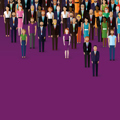Diversity data 2022/23 published
The Law Society of Scotland has published its latest diversity data, collected as part of the annual practising certificate (PC) renewal process to offer a key insight into the make-up of today’s Scottish legal profession.
This is the second time the Society has collected diversity data, which aims to help better understand what the profession looks like, support the Society’s equality and diversity work, and track changes within the profession over time. Questions on diversity were included for the first time in the 2020/21 PC renewal process and the data is collected every two years.
Around 80% of members completed the 2022/23 data, in line with the proportion of respondents in 2020/21, providing a truly comprehensive picture of the diversity of today’s profession.
Solicitors were asked for information on their ethnicity, disability, religion, sexual orientation, and social background. The data is automatically pseudonymised in order to protect members’ identities and does not form part of members’ information.
The high-level diversity data is intended to complement the in-depth Profile of the Profession research that is conducted every five years. The most recent Profile of the Profession survey ran earlier this year and the results will be published in late summer.
Sheila Webster, President of the Law Society of Scotland, said: “While there is only so much change that can happen within the profession in a two-year period, it is encouraging that the broad theme in each area is of progress towards a more representative profession that better reflects the society it serves.
“Of course, there is more yet to do, but the data provides us a strong evidence base to help set effective policies to address the issues identified and measure our progress towards a more inclusive profession.”
Read the full diversity data 2022/23 report here.
Key findings for 2022/23 include:
- The Scottish legal profession continues to gradually become more ethnically diverse.
- 86.48% of solicitors are white, compared to 88.01% in 2020/21.
- At least 4.01% of the profession is from a Black, Asian and Minority Ethnic (BAME) background, up 0.63% in two years.
- More than 10% of solicitors aged 30 and under are from an ethnic minority background, up more than 3% in two years.
- However, progress is not equal across all ethnicities. For example, solicitors under 30 from a Pakistani background have increased, while those under 30 from a Chinese background have decreased.
- The feminisation of the profession continues, with almost 57% of solicitors being female compared to 55% two years ago.
- There continues to be an acute issue attracting young men from an ethnic minority background into the profession, although there has been a slight improvement from 28% two years ago to 32.63% today.
- At least 4.18% of the profession is LGBTQ+, compared to 3.2% in 2020/21.
- Members identifying as LGBTQ+ rises to 6.6% for those aged 30 and under.
- At least 5.67% of the profession has a disability, such as blindness, deafness or a mobility impairment, compared to 4.8% in 2020/21.
- More than 47% of Scottish solicitors do not subscribe to a religion, up 1% on 2020/21.
- At least 67.1% of the solicitor population was state educated, compared to 66.7% in 2020/21.
- This proportion increases to at least 72.94% of those aged under 30.
The next set of diversity data will be collated during the PC renewal process of autumn 2024.

Diversity data 2022/23
Diversity data is collected every two years as part of the annual practising certificate renewal process, in order to better understand what the Scottish legal profession looks like, support and advance the Society's equality and diversity work, and measure progress. It offers a key insight into the make-up of the profession and was most recently collected in 2022/23.

